Essay on Bowel Cancer: Determinants, Risk Factors, and Interventions
VerifiedAdded on 2021/05/31
|6
|1550
|159
Essay
AI Summary
This essay, titled "Introduction to Health Science," explores bowel cancer, a significant health issue impacting individuals globally. It examines the determinants of bowel cancer, including age, genetics, and inflammatory bowel diseases like Crohn's disease and Ulcerative colitis. The essay also discusses lifestyle factors such as smoking, alcohol consumption, poor diets, and obesity as contributing risk factors. Moreover, it highlights the importance of screening as a crucial intervention for early detection and treatment, alongside maintaining a healthy weight, avoiding smoking and alcohol, engaging in physical activity, and consuming a balanced diet rich in fruits and vegetables. The author emphasizes the need for collaborative efforts from health organizations and governments to address bowel cancer through funding, resources, and public education on prevention and early detection strategies. Regular screening and healthy lifestyle choices are critical in preventing and combating bowel cancer. The essay concludes by stressing the adverse health and economic impacts of bowel cancer, advocating for coordinated action to save lives and reduce its burden.
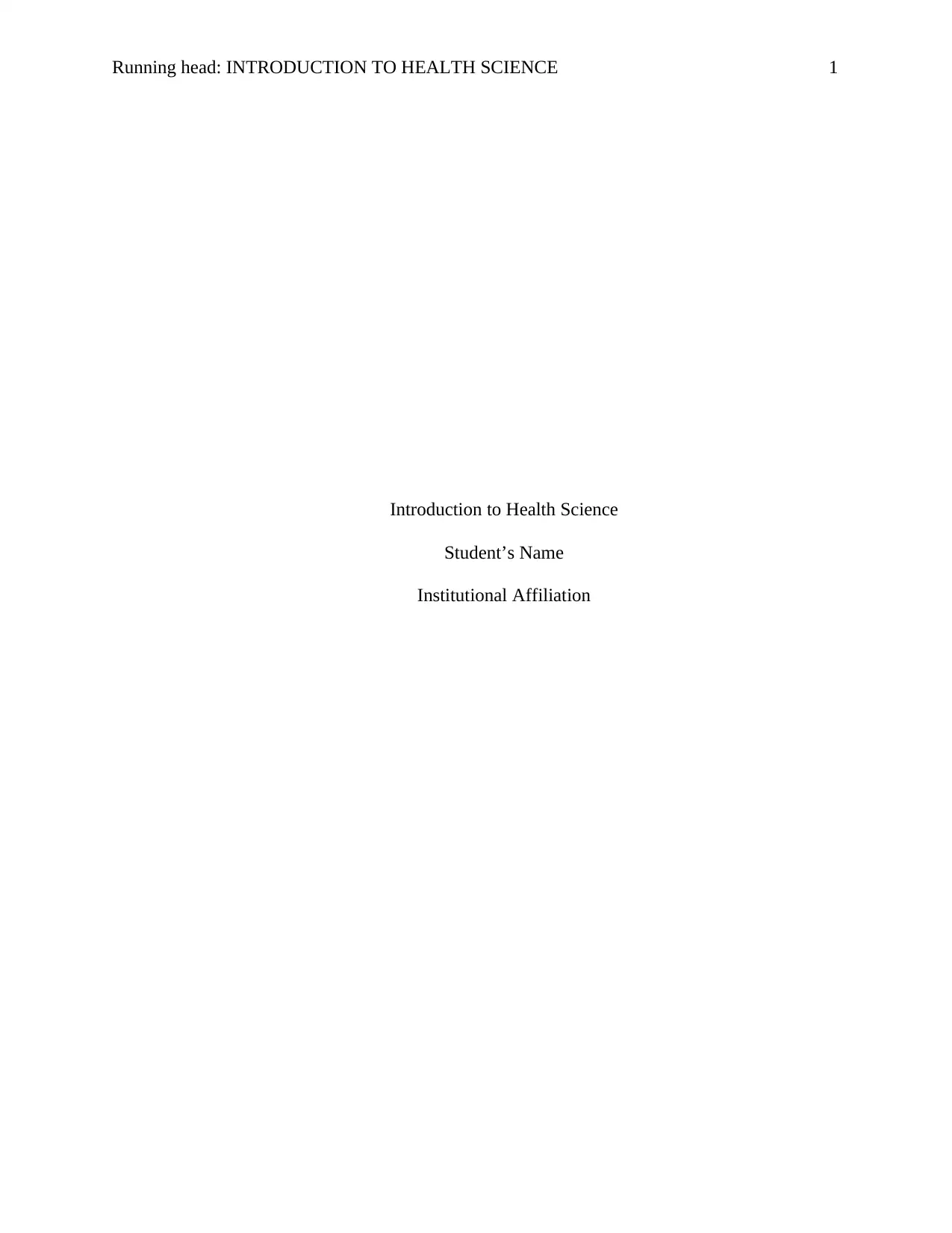
Running head: INTRODUCTION TO HEALTH SCIENCE 1
Introduction to Health Science
Student’s Name
Institutional Affiliation
Introduction to Health Science
Student’s Name
Institutional Affiliation
Paraphrase This Document
Need a fresh take? Get an instant paraphrase of this document with our AI Paraphraser
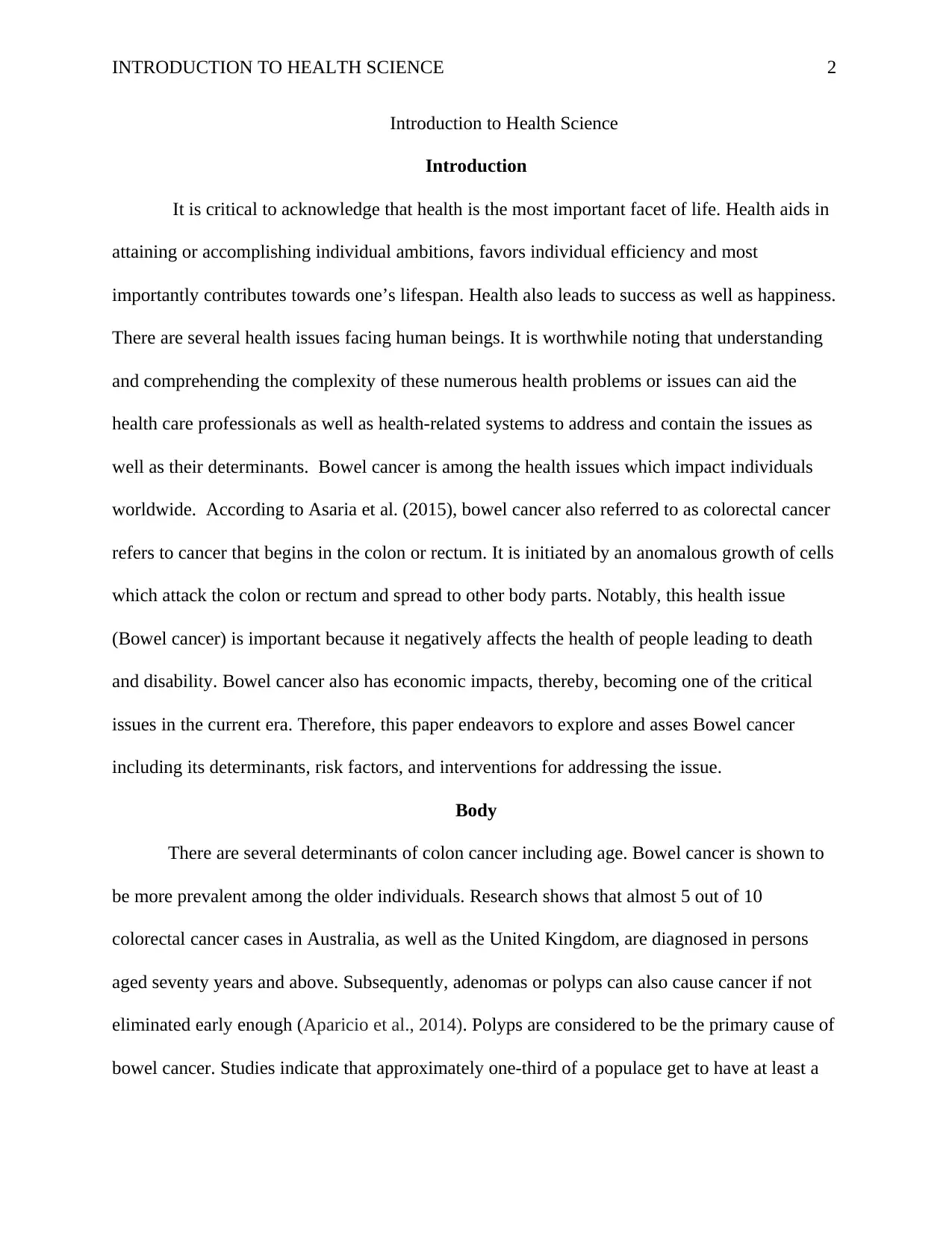
INTRODUCTION TO HEALTH SCIENCE 2
Introduction to Health Science
Introduction
It is critical to acknowledge that health is the most important facet of life. Health aids in
attaining or accomplishing individual ambitions, favors individual efficiency and most
importantly contributes towards one’s lifespan. Health also leads to success as well as happiness.
There are several health issues facing human beings. It is worthwhile noting that understanding
and comprehending the complexity of these numerous health problems or issues can aid the
health care professionals as well as health-related systems to address and contain the issues as
well as their determinants. Bowel cancer is among the health issues which impact individuals
worldwide. According to Asaria et al. (2015), bowel cancer also referred to as colorectal cancer
refers to cancer that begins in the colon or rectum. It is initiated by an anomalous growth of cells
which attack the colon or rectum and spread to other body parts. Notably, this health issue
(Bowel cancer) is important because it negatively affects the health of people leading to death
and disability. Bowel cancer also has economic impacts, thereby, becoming one of the critical
issues in the current era. Therefore, this paper endeavors to explore and asses Bowel cancer
including its determinants, risk factors, and interventions for addressing the issue.
Body
There are several determinants of colon cancer including age. Bowel cancer is shown to
be more prevalent among the older individuals. Research shows that almost 5 out of 10
colorectal cancer cases in Australia, as well as the United Kingdom, are diagnosed in persons
aged seventy years and above. Subsequently, adenomas or polyps can also cause cancer if not
eliminated early enough (Aparicio et al., 2014). Polyps are considered to be the primary cause of
bowel cancer. Studies indicate that approximately one-third of a populace get to have at least a
Introduction to Health Science
Introduction
It is critical to acknowledge that health is the most important facet of life. Health aids in
attaining or accomplishing individual ambitions, favors individual efficiency and most
importantly contributes towards one’s lifespan. Health also leads to success as well as happiness.
There are several health issues facing human beings. It is worthwhile noting that understanding
and comprehending the complexity of these numerous health problems or issues can aid the
health care professionals as well as health-related systems to address and contain the issues as
well as their determinants. Bowel cancer is among the health issues which impact individuals
worldwide. According to Asaria et al. (2015), bowel cancer also referred to as colorectal cancer
refers to cancer that begins in the colon or rectum. It is initiated by an anomalous growth of cells
which attack the colon or rectum and spread to other body parts. Notably, this health issue
(Bowel cancer) is important because it negatively affects the health of people leading to death
and disability. Bowel cancer also has economic impacts, thereby, becoming one of the critical
issues in the current era. Therefore, this paper endeavors to explore and asses Bowel cancer
including its determinants, risk factors, and interventions for addressing the issue.
Body
There are several determinants of colon cancer including age. Bowel cancer is shown to
be more prevalent among the older individuals. Research shows that almost 5 out of 10
colorectal cancer cases in Australia, as well as the United Kingdom, are diagnosed in persons
aged seventy years and above. Subsequently, adenomas or polyps can also cause cancer if not
eliminated early enough (Aparicio et al., 2014). Polyps are considered to be the primary cause of
bowel cancer. Studies indicate that approximately one-third of a populace get to have at least a
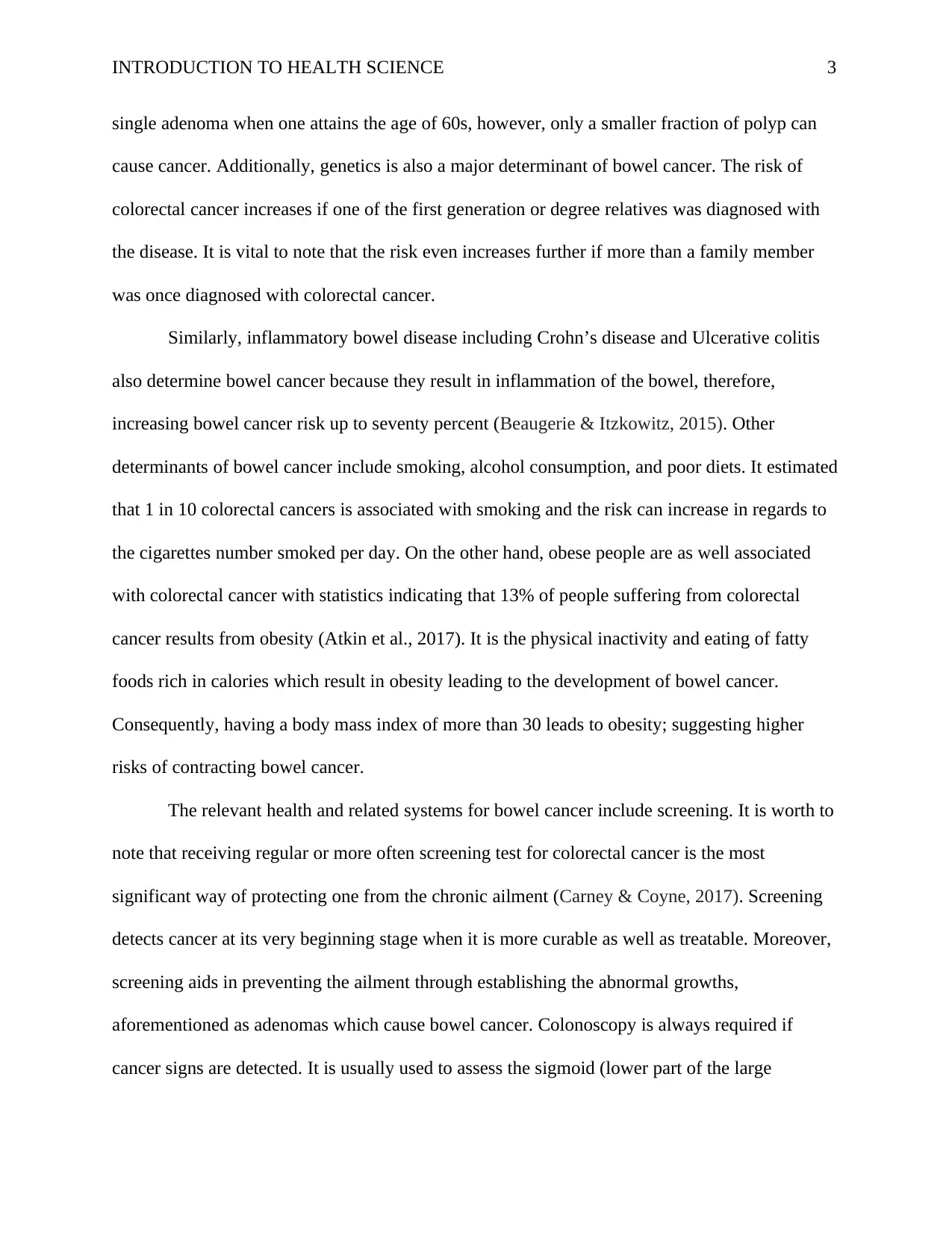
INTRODUCTION TO HEALTH SCIENCE 3
single adenoma when one attains the age of 60s, however, only a smaller fraction of polyp can
cause cancer. Additionally, genetics is also a major determinant of bowel cancer. The risk of
colorectal cancer increases if one of the first generation or degree relatives was diagnosed with
the disease. It is vital to note that the risk even increases further if more than a family member
was once diagnosed with colorectal cancer.
Similarly, inflammatory bowel disease including Crohn’s disease and Ulcerative colitis
also determine bowel cancer because they result in inflammation of the bowel, therefore,
increasing bowel cancer risk up to seventy percent (Beaugerie & Itzkowitz, 2015). Other
determinants of bowel cancer include smoking, alcohol consumption, and poor diets. It estimated
that 1 in 10 colorectal cancers is associated with smoking and the risk can increase in regards to
the cigarettes number smoked per day. On the other hand, obese people are as well associated
with colorectal cancer with statistics indicating that 13% of people suffering from colorectal
cancer results from obesity (Atkin et al., 2017). It is the physical inactivity and eating of fatty
foods rich in calories which result in obesity leading to the development of bowel cancer.
Consequently, having a body mass index of more than 30 leads to obesity; suggesting higher
risks of contracting bowel cancer.
The relevant health and related systems for bowel cancer include screening. It is worth to
note that receiving regular or more often screening test for colorectal cancer is the most
significant way of protecting one from the chronic ailment (Carney & Coyne, 2017). Screening
detects cancer at its very beginning stage when it is more curable as well as treatable. Moreover,
screening aids in preventing the ailment through establishing the abnormal growths,
aforementioned as adenomas which cause bowel cancer. Colonoscopy is always required if
cancer signs are detected. It is usually used to assess the sigmoid (lower part of the large
single adenoma when one attains the age of 60s, however, only a smaller fraction of polyp can
cause cancer. Additionally, genetics is also a major determinant of bowel cancer. The risk of
colorectal cancer increases if one of the first generation or degree relatives was diagnosed with
the disease. It is vital to note that the risk even increases further if more than a family member
was once diagnosed with colorectal cancer.
Similarly, inflammatory bowel disease including Crohn’s disease and Ulcerative colitis
also determine bowel cancer because they result in inflammation of the bowel, therefore,
increasing bowel cancer risk up to seventy percent (Beaugerie & Itzkowitz, 2015). Other
determinants of bowel cancer include smoking, alcohol consumption, and poor diets. It estimated
that 1 in 10 colorectal cancers is associated with smoking and the risk can increase in regards to
the cigarettes number smoked per day. On the other hand, obese people are as well associated
with colorectal cancer with statistics indicating that 13% of people suffering from colorectal
cancer results from obesity (Atkin et al., 2017). It is the physical inactivity and eating of fatty
foods rich in calories which result in obesity leading to the development of bowel cancer.
Consequently, having a body mass index of more than 30 leads to obesity; suggesting higher
risks of contracting bowel cancer.
The relevant health and related systems for bowel cancer include screening. It is worth to
note that receiving regular or more often screening test for colorectal cancer is the most
significant way of protecting one from the chronic ailment (Carney & Coyne, 2017). Screening
detects cancer at its very beginning stage when it is more curable as well as treatable. Moreover,
screening aids in preventing the ailment through establishing the abnormal growths,
aforementioned as adenomas which cause bowel cancer. Colonoscopy is always required if
cancer signs are detected. It is usually used to assess the sigmoid (lower part of the large
⊘ This is a preview!⊘
Do you want full access?
Subscribe today to unlock all pages.

Trusted by 1+ million students worldwide
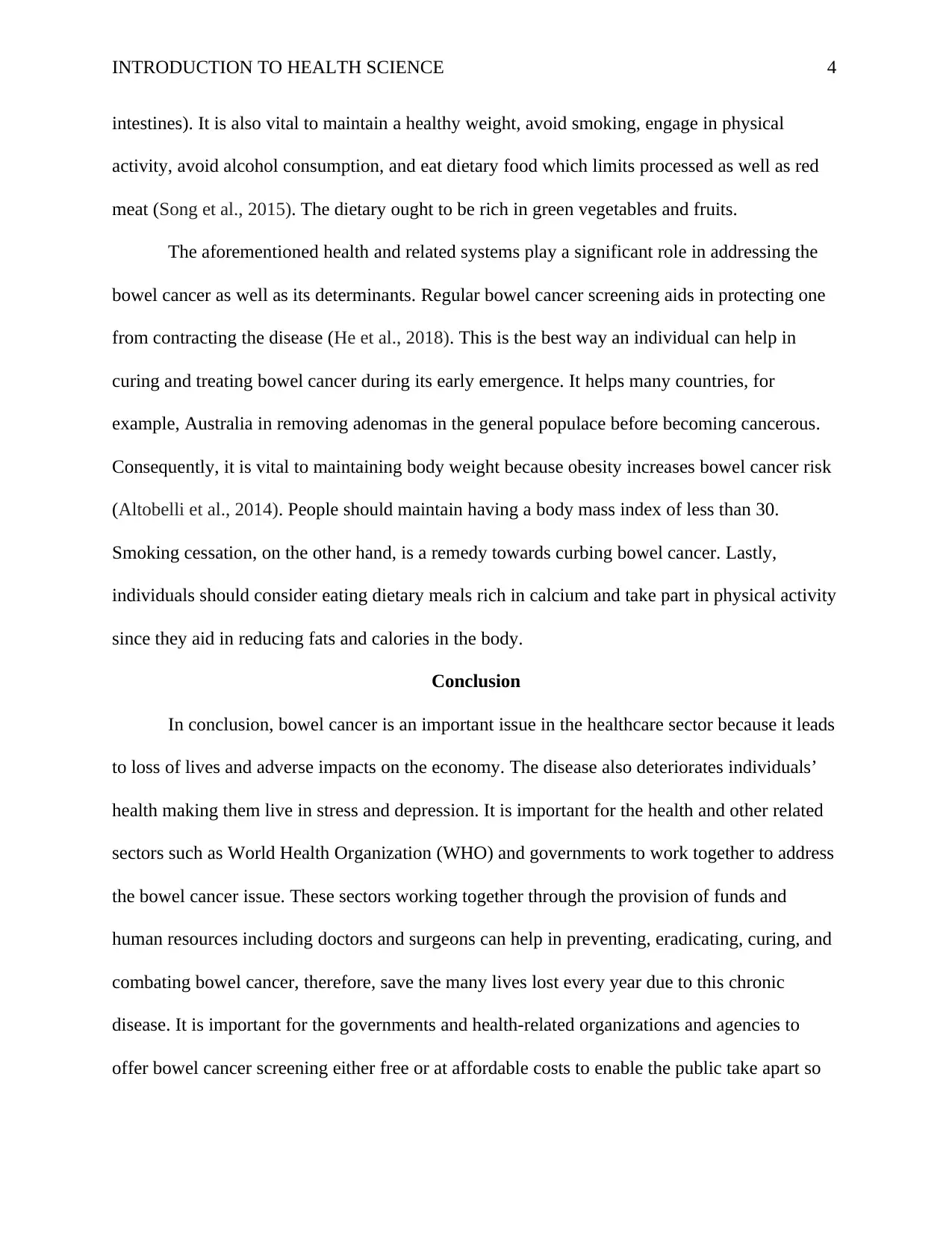
INTRODUCTION TO HEALTH SCIENCE 4
intestines). It is also vital to maintain a healthy weight, avoid smoking, engage in physical
activity, avoid alcohol consumption, and eat dietary food which limits processed as well as red
meat (Song et al., 2015). The dietary ought to be rich in green vegetables and fruits.
The aforementioned health and related systems play a significant role in addressing the
bowel cancer as well as its determinants. Regular bowel cancer screening aids in protecting one
from contracting the disease (He et al., 2018). This is the best way an individual can help in
curing and treating bowel cancer during its early emergence. It helps many countries, for
example, Australia in removing adenomas in the general populace before becoming cancerous.
Consequently, it is vital to maintaining body weight because obesity increases bowel cancer risk
(Altobelli et al., 2014). People should maintain having a body mass index of less than 30.
Smoking cessation, on the other hand, is a remedy towards curbing bowel cancer. Lastly,
individuals should consider eating dietary meals rich in calcium and take part in physical activity
since they aid in reducing fats and calories in the body.
Conclusion
In conclusion, bowel cancer is an important issue in the healthcare sector because it leads
to loss of lives and adverse impacts on the economy. The disease also deteriorates individuals’
health making them live in stress and depression. It is important for the health and other related
sectors such as World Health Organization (WHO) and governments to work together to address
the bowel cancer issue. These sectors working together through the provision of funds and
human resources including doctors and surgeons can help in preventing, eradicating, curing, and
combating bowel cancer, therefore, save the many lives lost every year due to this chronic
disease. It is important for the governments and health-related organizations and agencies to
offer bowel cancer screening either free or at affordable costs to enable the public take apart so
intestines). It is also vital to maintain a healthy weight, avoid smoking, engage in physical
activity, avoid alcohol consumption, and eat dietary food which limits processed as well as red
meat (Song et al., 2015). The dietary ought to be rich in green vegetables and fruits.
The aforementioned health and related systems play a significant role in addressing the
bowel cancer as well as its determinants. Regular bowel cancer screening aids in protecting one
from contracting the disease (He et al., 2018). This is the best way an individual can help in
curing and treating bowel cancer during its early emergence. It helps many countries, for
example, Australia in removing adenomas in the general populace before becoming cancerous.
Consequently, it is vital to maintaining body weight because obesity increases bowel cancer risk
(Altobelli et al., 2014). People should maintain having a body mass index of less than 30.
Smoking cessation, on the other hand, is a remedy towards curbing bowel cancer. Lastly,
individuals should consider eating dietary meals rich in calcium and take part in physical activity
since they aid in reducing fats and calories in the body.
Conclusion
In conclusion, bowel cancer is an important issue in the healthcare sector because it leads
to loss of lives and adverse impacts on the economy. The disease also deteriorates individuals’
health making them live in stress and depression. It is important for the health and other related
sectors such as World Health Organization (WHO) and governments to work together to address
the bowel cancer issue. These sectors working together through the provision of funds and
human resources including doctors and surgeons can help in preventing, eradicating, curing, and
combating bowel cancer, therefore, save the many lives lost every year due to this chronic
disease. It is important for the governments and health-related organizations and agencies to
offer bowel cancer screening either free or at affordable costs to enable the public take apart so
Paraphrase This Document
Need a fresh take? Get an instant paraphrase of this document with our AI Paraphraser
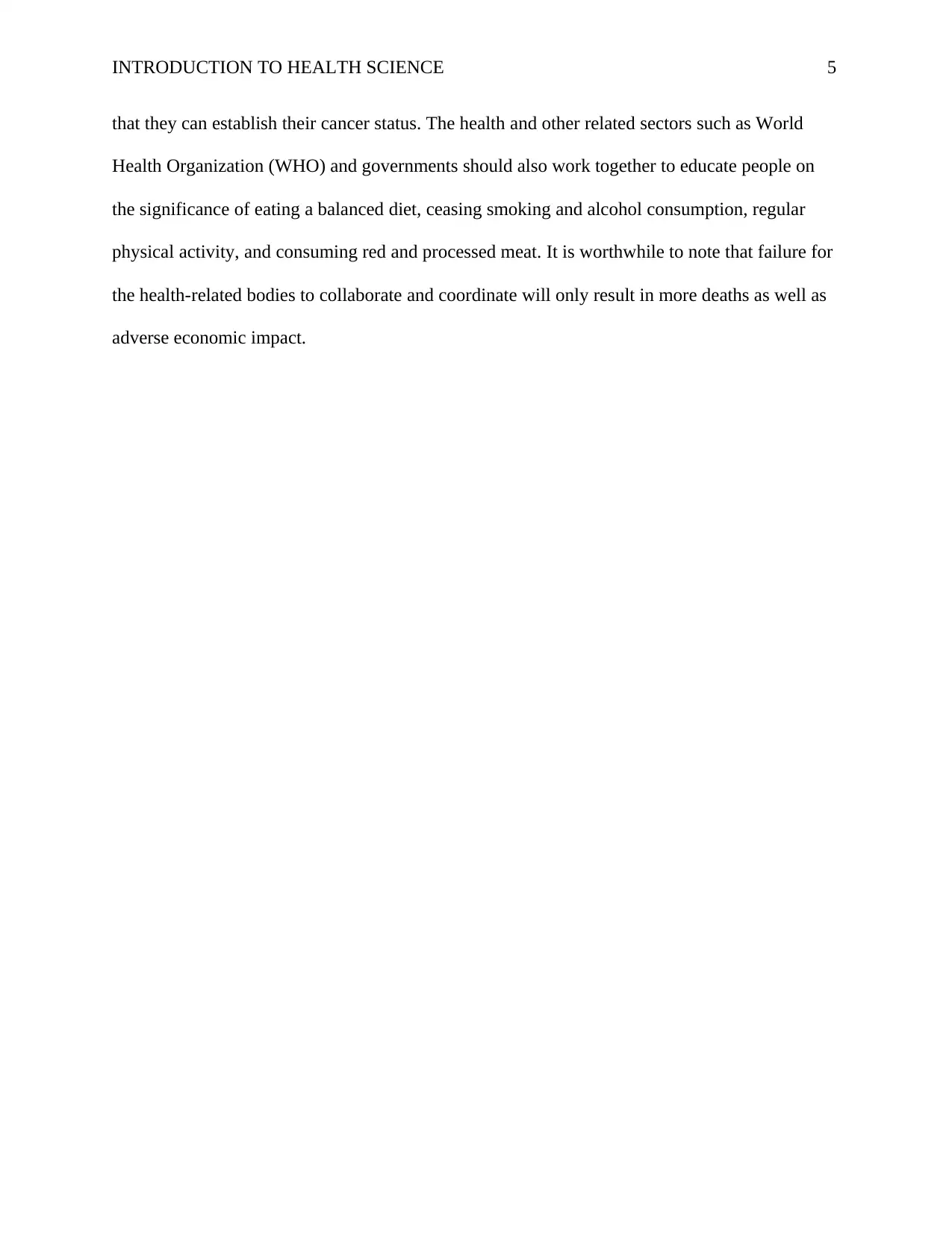
INTRODUCTION TO HEALTH SCIENCE 5
that they can establish their cancer status. The health and other related sectors such as World
Health Organization (WHO) and governments should also work together to educate people on
the significance of eating a balanced diet, ceasing smoking and alcohol consumption, regular
physical activity, and consuming red and processed meat. It is worthwhile to note that failure for
the health-related bodies to collaborate and coordinate will only result in more deaths as well as
adverse economic impact.
that they can establish their cancer status. The health and other related sectors such as World
Health Organization (WHO) and governments should also work together to educate people on
the significance of eating a balanced diet, ceasing smoking and alcohol consumption, regular
physical activity, and consuming red and processed meat. It is worthwhile to note that failure for
the health-related bodies to collaborate and coordinate will only result in more deaths as well as
adverse economic impact.
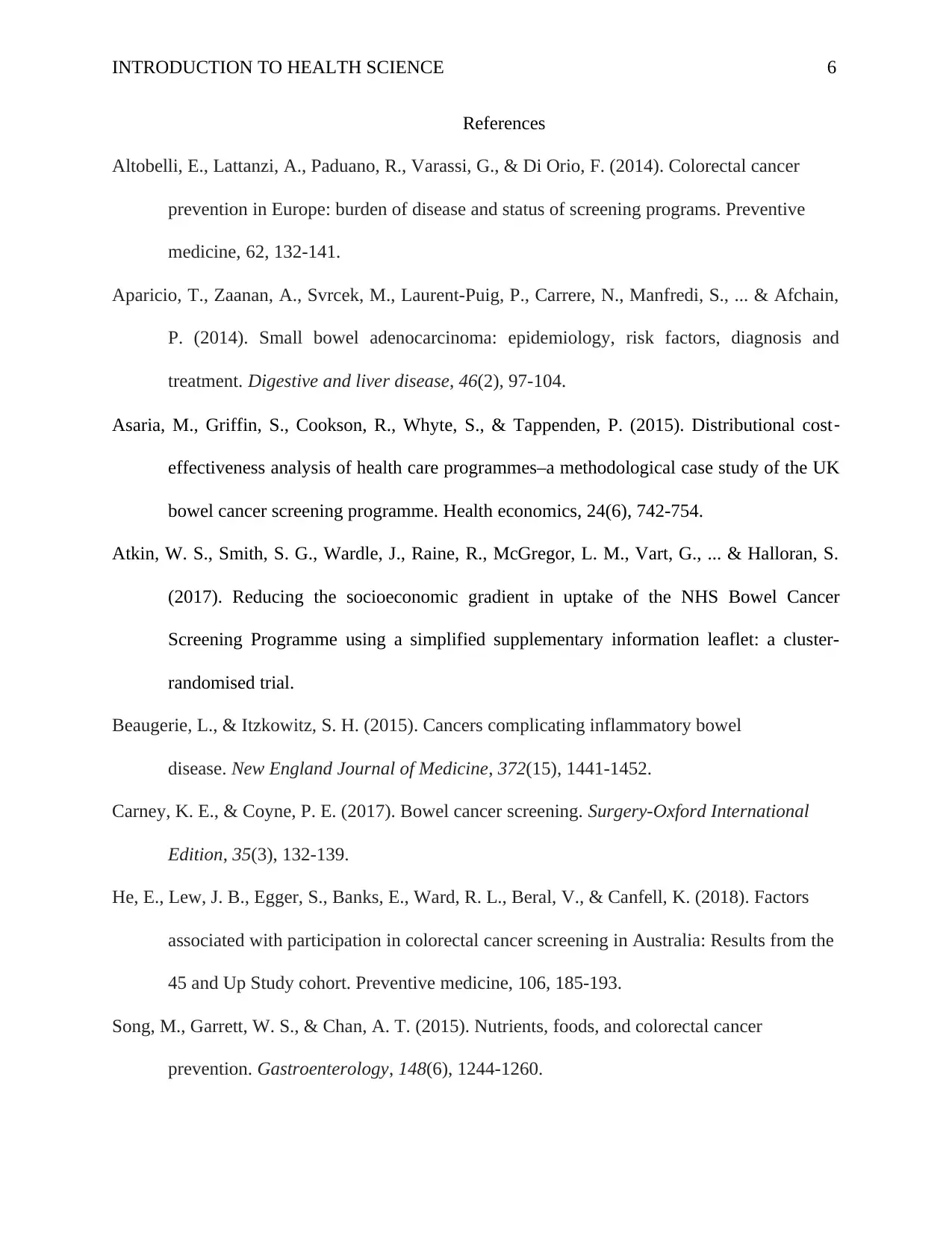
INTRODUCTION TO HEALTH SCIENCE 6
References
Altobelli, E., Lattanzi, A., Paduano, R., Varassi, G., & Di Orio, F. (2014). Colorectal cancer
prevention in Europe: burden of disease and status of screening programs. Preventive
medicine, 62, 132-141.
Aparicio, T., Zaanan, A., Svrcek, M., Laurent-Puig, P., Carrere, N., Manfredi, S., ... & Afchain,
P. (2014). Small bowel adenocarcinoma: epidemiology, risk factors, diagnosis and
treatment. Digestive and liver disease, 46(2), 97-104.
Asaria, M., Griffin, S., Cookson, R., Whyte, S., & Tappenden, P. (2015). Distributional cost‐
effectiveness analysis of health care programmes–a methodological case study of the UK
bowel cancer screening programme. Health economics, 24(6), 742-754.
Atkin, W. S., Smith, S. G., Wardle, J., Raine, R., McGregor, L. M., Vart, G., ... & Halloran, S.
(2017). Reducing the socioeconomic gradient in uptake of the NHS Bowel Cancer
Screening Programme using a simplified supplementary information leaflet: a cluster-
randomised trial.
Beaugerie, L., & Itzkowitz, S. H. (2015). Cancers complicating inflammatory bowel
disease. New England Journal of Medicine, 372(15), 1441-1452.
Carney, K. E., & Coyne, P. E. (2017). Bowel cancer screening. Surgery-Oxford International
Edition, 35(3), 132-139.
He, E., Lew, J. B., Egger, S., Banks, E., Ward, R. L., Beral, V., & Canfell, K. (2018). Factors
associated with participation in colorectal cancer screening in Australia: Results from the
45 and Up Study cohort. Preventive medicine, 106, 185-193.
Song, M., Garrett, W. S., & Chan, A. T. (2015). Nutrients, foods, and colorectal cancer
prevention. Gastroenterology, 148(6), 1244-1260.
References
Altobelli, E., Lattanzi, A., Paduano, R., Varassi, G., & Di Orio, F. (2014). Colorectal cancer
prevention in Europe: burden of disease and status of screening programs. Preventive
medicine, 62, 132-141.
Aparicio, T., Zaanan, A., Svrcek, M., Laurent-Puig, P., Carrere, N., Manfredi, S., ... & Afchain,
P. (2014). Small bowel adenocarcinoma: epidemiology, risk factors, diagnosis and
treatment. Digestive and liver disease, 46(2), 97-104.
Asaria, M., Griffin, S., Cookson, R., Whyte, S., & Tappenden, P. (2015). Distributional cost‐
effectiveness analysis of health care programmes–a methodological case study of the UK
bowel cancer screening programme. Health economics, 24(6), 742-754.
Atkin, W. S., Smith, S. G., Wardle, J., Raine, R., McGregor, L. M., Vart, G., ... & Halloran, S.
(2017). Reducing the socioeconomic gradient in uptake of the NHS Bowel Cancer
Screening Programme using a simplified supplementary information leaflet: a cluster-
randomised trial.
Beaugerie, L., & Itzkowitz, S. H. (2015). Cancers complicating inflammatory bowel
disease. New England Journal of Medicine, 372(15), 1441-1452.
Carney, K. E., & Coyne, P. E. (2017). Bowel cancer screening. Surgery-Oxford International
Edition, 35(3), 132-139.
He, E., Lew, J. B., Egger, S., Banks, E., Ward, R. L., Beral, V., & Canfell, K. (2018). Factors
associated with participation in colorectal cancer screening in Australia: Results from the
45 and Up Study cohort. Preventive medicine, 106, 185-193.
Song, M., Garrett, W. S., & Chan, A. T. (2015). Nutrients, foods, and colorectal cancer
prevention. Gastroenterology, 148(6), 1244-1260.
⊘ This is a preview!⊘
Do you want full access?
Subscribe today to unlock all pages.

Trusted by 1+ million students worldwide
1 out of 6
Related Documents
Your All-in-One AI-Powered Toolkit for Academic Success.
+13062052269
info@desklib.com
Available 24*7 on WhatsApp / Email
![[object Object]](/_next/static/media/star-bottom.7253800d.svg)
Unlock your academic potential
Copyright © 2020–2026 A2Z Services. All Rights Reserved. Developed and managed by ZUCOL.





